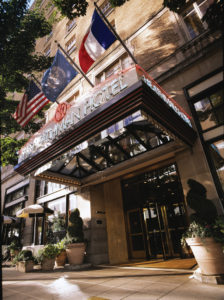PORTLAND, OR—The City of Roses is in the midst of a development boom.
The northwestern city has 41 properties currently in the supply pipeline, according to CBRE Hotels’ Americas Research. Supply rose 2.1% in the last five years and is expected to see a 3.4% increase in the next five. Along with that, the demand increased 2.5% in the last five years and is expected to increase 2.9% in the next five.
“Portland is currently experiencing a hotel development boom, which is expected to add some pressure to the occupancy and ADR until the demand catches up,” said Klaudio Simic, VP of operations, Provenance Hotels, which owns and manages six hotels here. “This is likely to result in more options and offers for consumers. While the profit margins might erode slightly in the short term, we do expect the demand to pick up within the next 12 to 18 months, post completion of the major hotel projects currently in progress. Our prediction for Portland is a favorable one. We anticipate the popularity to remain high, especially now that the West Coast hubs, such as San Francisco and Seattle, are dealing with the higher cost of living and congestion.”
Alan M. Jutte, VP, CBRE Hotels, said that the city has done well in recent years on the occupancy side until recently, when the new supply has come online. “For a while there, from 2011 to 2016, they were running in the low- to mid-80% range,” he said. “All of those properties were really ‘rocking and rolling’ so to speak. The rates were continually increasing until a couple of years ago when this new supply started coming on. That is when the market started turning around a little bit. You had hotels like the Hampton Inn open and the Porter Hotel, The Autograph, the AC Hotel. They are great hotels, but it got to a point where there was a little bit of softening in the market. There are still some other hotels, namely a big Hyatt by the convention center, that is still under construction.”
According to CBRE, in 2018, Portland hotels finished the year with a RevPAR loss of 1%. This was the result of a decline in occupancy of 1.6% and a 0.6% gain in ADR. Portland’s lower-priced properties suffered less of a RevPAR decline (-0.7%) in 2018 compared with its upper-priced properties (-1.8%). The properties in this category attained a 1.5% gain in ADR, but suffered a 2.1% decrease in occupancy. Upper-priced hotels experienced an ADR decline of 0.6%, along with a 1.2% loss in occupancy.
For 2019, CBRE expects Portland RevPAR to grow 2.2%. Occupancy is forecast to rise 0.1%, while average room rates are projected to increase 2.1%. Revenue is expected to continue to climb in 2020.
Jutte expects the city to grow with the new supply. “One reason Seattle continues to grow is because compared to the Bay area, it is still affordable—although it is expensive for locals,” he said. “Portland looks like a steal. Because of that dynamic, I think you’re going to see a lot of people moving into the city.”
What Portland lacks with regard to demand generators, he said, are the “big players” in the downtown market, like Seattle has with Facebook. “It has Intel and Nike, but those are in the suburban markets. You are seeing a lot of supply out that way as well,” he said. “That being said, Portland has a lot of good things going for it. It is a very cultural city. It has got a very lively downtown area. Pearl District has lots of cool bars and restaurants. People traveling into Portland like that. It remains to be seen how much more RevPAR is going to drop, but I think long term, it is going to be in a pretty good position overall.”
Provenance was founded in the city in 1985. “Portland is the birthplace of our company and, as such, it holds a special place in our hearts,” said Simic. “The market’s lifestyle and culture have informed our approach to the hotel business. We embrace everything that is good about the destination—creativity, independence, entrepreneurship, irreverence and free thinking—and incorporate that spirit into our daily operations.”
He said that the market has a number of boutique hotels, and that the new properties can benefit them. “Portland has become a highly competitive hotel marketplace,” he said. “With an influx of new supply, the city’s boutique hotels have an opportunity to differentiate themselves further from the competition and mitigate the supply pressure by focusing on the holistic guest experience. Exciting F&B experiences and unique programming create the soul of the hotel, which entices both local and visiting guests—this positioning allows boutique hotels to remain competitive and maybe even gain market share despite the new product.” HB


